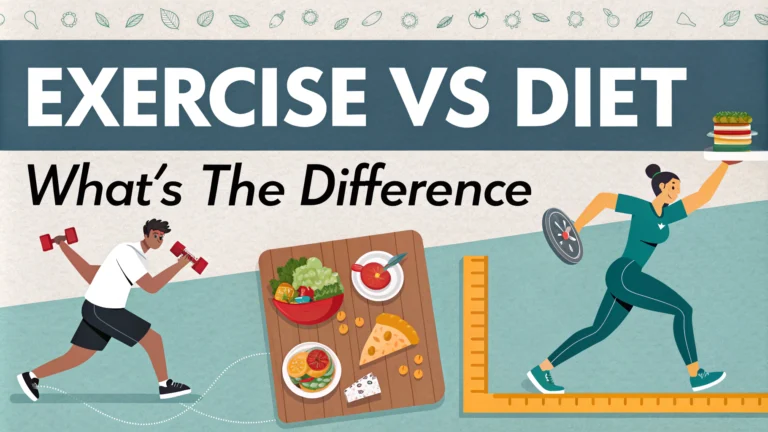The age-old debate between **exercise** and **diet** continues to puzzle those seeking a healthier lifestyle. Both play distinct roles in our overall health and weight management journey – yet they work through different mechanisms.
Research shows that while **exercise** burns calories and builds muscle, **diet** accounts for roughly 80% of weight loss results. Understanding how these components work together can help create an effective health strategy.
Key Differences Between Exercise and Diet
- **Calorie Impact**: Diet directly controls intake, exercise burns existing calories
- **Time Investment**: Diet changes show quicker initial results
- **Body Response**: Exercise builds muscle and bone density, diet affects metabolism
- **Health Benefits**: Each provides unique advantages that complement each other
The Science Behind Diet’s Impact
**Nutritional intake** directly affects our body’s hormonal balance and metabolic rate. A balanced diet provides essential nutrients while managing calorie consumption.
| Diet Focus | Primary Benefits |
|---|---|
| Protein | Muscle maintenance, satiety |
| Complex Carbs | Sustained energy, fiber |
| Healthy Fats | Hormone production, nutrient absorption |
Exercise Benefits Beyond Weight Loss
- Improves **cardiovascular health** and endurance
- Builds **muscle strength** and bone density
- Enhances **mental health** through endorphin release
- Boosts **metabolic rate** for hours after activity
“Exercise is king, nutrition is queen. Put them together and you’ve got a kingdom.” – Jack LaLanne
Finding Balance: Exercise vs Diet – What Really Works?
Getting fit doesn’t need to be complicated. By understanding how **exercise** and **diet** work together, you can create a practical plan for your health goals. This guide breaks down what works, why it matters, and how to make lasting changes.
Creating a Sustainable Balance
Both **exercise** and **diet** matter, but finding your personal balance is key. Start small with food changes – they bring quicker results. Add movement gradually to build lasting habits.
- Set realistic food goals before changing workouts
- Track portions instead of counting every calorie
- Choose activities you actually enjoy
- Plan rest days to prevent burnout
Making Time for Both
Schedule your week to include both **meal prep** and **exercise**:
| Time Block | Activity |
|---|---|
| Sunday | Meal prep basics |
| Weekdays | 30-min workouts |
| Saturday | Active recovery |
Setting Realistic Goals
Focus on **behavior changes** rather than just numbers:
- Add one vegetable to each meal
- Walk 10 minutes after lunch
- Drink water before snacking
- Get 7-8 hours of sleep
“Progress is made by daily choices, not occasional grand gestures.”
Your Action Steps
Start with these simple changes:
- Replace one processed food with whole food daily
- Move for 15 minutes each morning
- Pack healthy snacks for work
- Track progress weekly, not daily
Remember: **Small changes** add up to significant results when maintained consistently. Focus on building habits that fit your lifestyle rather than following extreme plans.
Exercise vs Diet FAQs
1. Which is more important for weight loss – diet or exercise?
Diet contributes approximately 70-80% to weight loss results, while exercise contributes 20-30%. The phrase “you can’t outrun a bad diet” is scientifically accurate.
2. How many calories does exercise burn compared to reducing food intake?
A 30-minute jog burns about 250-300 calories, while simply eliminating a large muffin saves 400-500 calories. This demonstrates why dietary changes create faster results.
3. Can you lose weight through exercise alone?
While possible, it’s extremely challenging. To lose 1 pound through exercise alone requires burning about 3,500 extra calories, equivalent to running 35 miles.
4. What combination of diet and exercise is optimal for fat loss?
Research suggests:
- 500-750 calorie daily deficit through diet
- 3-4 strength training sessions weekly
- 2-3 cardio sessions weekly
5. Does exercise increase hunger and affect diet adherence?
Intense exercise can temporarily increase appetite through hunger hormones like ghrelin. Moderate exercise typically doesn’t significantly impact hunger levels.
6. How do macronutrients affect exercise performance?
| Nutrient | Effect on Exercise |
|---|---|
| Carbohydrates | Primary energy source for high-intensity exercise |
| Protein | Essential for muscle recovery and maintenance |
| Fat | Energy source for low-intensity, longer duration activities |
7. Which burns more calories: cardio or strength training?
Cardio typically burns more calories during the session, but strength training creates a longer afterburn effect (EPOC) and increases resting metabolic rate.
8. How does meal timing affect workout performance?
Eating 2-3 hours before exercise provides optimal energy. Post-workout nutrition within 30 minutes helps with recovery and muscle protein synthesis.
9. What’s the minimum exercise needed for health benefits?
150 minutes of moderate activity or 75 minutes of vigorous activity weekly provides basic health benefits, according to WHO guidelines.
10. Can you build muscle in a caloric deficit?
Yes, but mainly in:
- Beginners to strength training
- Those returning after a break
- People with significant body fat
11. How does sleep affect diet and exercise results?
Poor sleep:
- Increases hunger hormones
- Reduces exercise performance
- Impairs muscle recovery
- Affects food choices negatively
12. What’s the best exercise for belly fat reduction?
Spot reduction is a myth. Total body fat loss through diet combined with a mix of cardio and strength training is most effective for reducing belly fat.



















